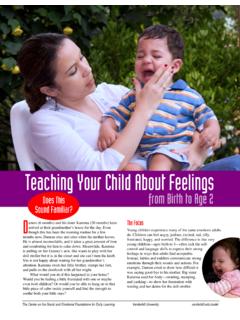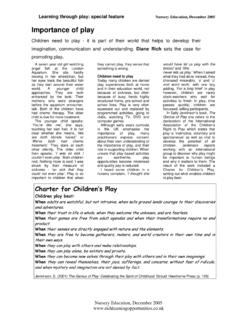Transcription of Social and Emotional Health of Children Birth to Age …
1 What is Social and Emotional Health ? Social and Emotional Health is a child s growing ability to, Form strong relationships with others Express and manage emotions Explore the world around them and problem-solveWhy is Social and Emotional Health so Important? Social and Emotional skills are as important as ABC s and 1, 2, 3 s. Babies need relationships with loving adults to learn these skills. Loving relationships also help babies brains to grow and develop. When Children have this healthy foundation, they are more likely to: make friends follow directions control emotions solve problems focus on tasksChildren who do not have these Social and Emotional skills are less prepared to learn in school. They are more likely to: have trouble making friends have behavior problems like biting, hitting, using unkind words or bullying have difficulty learning drop out of schoolEarly Social and Emotional problems have been linked to later mental and physical problems like depression, and obesity.
2 How Can You Support Children s Social and Emotional Health ? Children need help from adults to learn how to get along with others and manage their feelings. Many of the things adults do with Children every day can help a child to gain Social and Emotional skills, such as, cuddling, sharing a laugh and playing with an infant or toddler taking time to listen, engage and talk with a preschooler about their day showing interest in a school age child s friends, activities and projects Safe and loving relationships with parents and caregivers are crucial to Social and Emotional Health for all Children Birth to age and Emotional Health of Children Birth to Age 8 Fact SheetSigns of Social Emotional HealthInfants and Toddlers age 0-3.
3 Cry, coo, smile and laugh Look at faces Accept comfort from a familiar person Seek comfort Show curiosity Express many feelingsPreschoolers age 3-5: Begin to show feelings for others Try new things Play well with others Play make-believe Listen to gentle reminders Accept changes in routineEarly Elementary ages 5-8: Show respect and kindness towards others Develop and keep friendships Begin to work independently Enjoy challenges Focus attention to solve problems and complete tasksWhy Should we Fund Services to Support Children s Social and Emotional Health ?The future starts now. We all benefit when Children get a good start in life. It means later we will have a talented workforce, stronger economy and a healthier society.
4 The nurturing relationships that support Social and Emotional Health in early life shape the architecture of a baby s brain and build the foundation for lifelong learning, good Health , and success in the all pay the price when young Children do not get a healthy start. Those that experience trauma or other adverse experiences, increases the likelihood of physical and mental Health problems. Research shows that young Children with mental Health problems ultimately have lower educational achievement, and greater involvement in the criminal justice and child welfare Michigan, this means a less educated and prepared workforce, and greater public costs. Our state policies should support families with young Children beginning at Birth so they have good Social and Emotional Health and positive early learning experiences.
5 What are Some Important Policy Recommendations?Michigan must ensure that young Children , and their parents and caretakers, have access to needed mental Health services, beginning with the following priorities:1. Screen early. Increase the use of standardized tools to screen for Social and Emotional problems in young Children wherever they learn and grow. Ensure these screenings link Children to services early to offset negative lifelong Increase provider payment. Create policies that ensure all Children can get screenings by creating easy and fair reimbursement strategies for primary care Promote Social and Emotional Health , reducing stigma. Social and Emotional Health is part of every child s growth and is just as important as learning to walk and talk.
6 Social and Emotional Health should be part of every early childhood program s vision and agenda. 4. Provide prevention services that work. Provide evidence-based services to support Social and Emotional Health to families and non-parental caregivers to ensure that the mental Health needs of young Children in childcare, preschool and other early learning settings are identified and Michigan, we believe Social - Emotional Health matters!To learn more about what you can do to build Social Emotional Health , access the Michigan Social and Emotional Toolkit online at Brought to you buy the Michigan Great Start Systems Team, including the Michigan Department of Community Health , Michigan Department of Education, Michigan Department of Human Services, the Early Childhood Investment Corporation, and Project LAUNCH.














